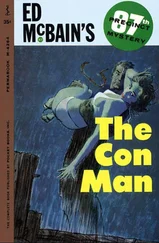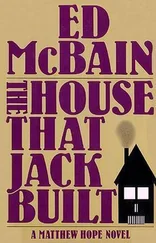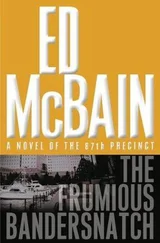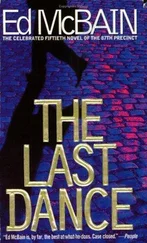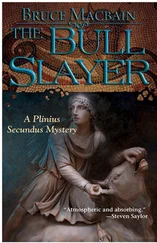Ed Mcbain - The Heckler
Здесь есть возможность читать онлайн «Ed Mcbain - The Heckler» весь текст электронной книги совершенно бесплатно (целиком полную версию без сокращений). В некоторых случаях можно слушать аудио, скачать через торрент в формате fb2 и присутствует краткое содержание. Жанр: Полицейский детектив, на английском языке. Описание произведения, (предисловие) а так же отзывы посетителей доступны на портале библиотеки ЛибКат.
- Название:The Heckler
- Автор:
- Жанр:
- Год:неизвестен
- ISBN:нет данных
- Рейтинг книги:4 / 5. Голосов: 1
-
Избранное:Добавить в избранное
- Отзывы:
-
Ваша оценка:
- 80
- 1
- 2
- 3
- 4
- 5
The Heckler: краткое содержание, описание и аннотация
Предлагаем к чтению аннотацию, описание, краткое содержание или предисловие (зависит от того, что написал сам автор книги «The Heckler»). Если вы не нашли необходимую информацию о книге — напишите в комментариях, мы постараемся отыскать её.
The Heckler — читать онлайн бесплатно полную книгу (весь текст) целиком
Ниже представлен текст книги, разбитый по страницам. Система сохранения места последней прочитанной страницы, позволяет с удобством читать онлайн бесплатно книгу «The Heckler», без необходимости каждый раз заново искать на чём Вы остановились. Поставьте закладку, и сможете в любой момент перейти на страницу, на которой закончили чтение.
Интервал:
Закладка:
Pop prepared his bombs.
He filled a shoe box with oil-soaked rags. Into the center of the box, he set a small cardboard container filled with a mixture of potassium chlorate and powdered sugar, sealed so that the mixture would not spill out. Into the top surface of the small container, he cut a hole which would accommodate the neck of a small bottle. The bottle would be filled with a 70 per cent solution of sulfuric acid, sealed with a cork cap which was one fortieth of an inch thick, and then stuck into the hole in the top of the container at twelve noon, when the men left to do their work. In approximately four hours’ time, the acid would have eaten through the cork and begun to drip onto the mixture in the container. A violent fire would ensue, aided and assisted by the oil-soaked rags. In other words, the fires would begin at approximately four o’clock— approximately because it was difficult to cut a slice of cork exactly one fortieth of an inch thick and a variation in millimeters would, because the rate of char remained constant, start the conflagration either slightly earlier or slightly later. In any case, Pop estimated, the fires would start at about four o’clock, give or take a few minutes either way, and the deaf man seemed more than pleased with the estimate.
At twelve noon, Chuck and Pop stuck the bottles of sulfuric acid into the holes cut in the cardboard containers, the thin slices of cork being the only thing between the acid and the mixture. Then they sealed the shoe boxes, packed their suitcases, and trotted off to disrupt a city.
BY ONE-THIRTY,when the ball game started, Chuck had set three incendiary bombs and one exploding bomb in the baseball stadium near the River Harb. He had set two of the incendiaries in the grandstand, and the third in the bleachers. The explosive had been left just inside the main entrance arch, in a trash basket there. The deaf man had figured that the game would break sometime around four-thirty. The bomb was set for four-fifteen, and he hoped its explosion would cause a bit of confusion among the departing spectators—especially since there would be three fires in the stadium by that time. To insure that the fires would still be roaring by the time the bomb exploded, he had instructed Chuck to cut the hoses of every fire extinguisher he saw anywhere in the stadium, and Chuck had done that and was now anxious to get away before anyone spotted him.
There were eight bombs left in Chuck’s valise. He consulted his two remaining maps, each marked with his name in the right-hand corner, and began moving quickly toward his remaining destinations. The first of these was a motion picture theater on The Stem. He paid for a ticket at the box office, climbed instantly to the balcony, and consulted his map again. Two X’s on the map indicated where he was to place the explosives, directly over the balcony’s supporting columns and close to the projection booth where there was the attendant possibility of the explosion causing a fire and a stench when it hit the film. The main purpose of the blasts, of course, was to knock down the balcony, but the deaf man was not a person to turn aside residuals. In the corridor outside the balcony, Chuck glanced around hastily, and then slashed the hoses on the extinguishers. Rapidly, he left the theater. A glance at his watch told him it was two-fifteen. He would damn well have to hurry if he wanted to catch that four-oh-five boat.
He was now in possession of six remaining bombs.
The deaf man wanted three of them to be placed in Union Station: an incendiary in the baggage room, an explosive on the track of the incoming Chicago Express (due at four-ten), and another explosive on the counter of the circular information booth.
The remaining three bombs could be placed by Chuck at his discretion—provided, of course, they were all deposited at different locations on the south side of the precinct. The deaf man had suggested leaving an incendiary in a subway car, and an explosive in the open-air market on Chament Avenue, but the final decisions were being left to Chuck, dependent on time and circumstance.
“Suppose I put them where there aren’t any people?” Chuck had asked.
“That would be foolish,” the deaf man said.
“I mean, look, this is supposed to be a bank heist.”
“Yes?”
“So why do we have to put these things where—where a lot of people’ll get hurt?”
“Where would you like to put them? In an empty lot?”
“Well, no, but—”
“I’ve never heard of confusion in a vacuum,” the deaf man had replied.
“Still—dammit, suppose we get caught? You’re fooling around with—with murder here, do you realize that? Murder!”
“So?”
“So look, I know there are guys who’d slit their own grandmother’s throat for a nickel, but—”
“I’m not one of them,” the deaf man had answered coldly. “There happens to be two and a half million dollars at stake here.” He had paused. “Do you want out, Chuck?”
Chuck had not wanted out. Now, as he headed for Union Station, the suitcase was noticeably and happily lighter. He was itching to get the job over and done with. He didn’t want to be anywhere south of the Mercantile Trust Company after four o’clock. If everything went according to the deaf man’s plan, that part of the precinct would be an absolute madhouse along about then, and Chuck wanted no part of chaos.
THE OIL REFINERYwas set on the River Dix, at the southern tip of the island of Isola. Pop walked up to the main gate and reached into his pocket for the identification badge the deaf man had given him. He flashed the badge casually at the guard, and the guard nodded, and Pop walked through the gate, stopped once to consult the X’s on his map, and then walked directly to the tool shed behind the administration building. The tool shed, besides being stocked with the usual number of saws and hammers and screwdrivers, contained a few dozen cans of paint, turpentine, and varnish. Pop opened the door of the shed and put one of his explosive bombs in a cardboard carton of trash just inside the door. Then he closed the door and began walking toward the paymaster’s shack near the first of the huge oil tanks.
By one-forty-five he had set four bombs in the refinery. He walked through the main gate, waved goodbye to the guard, hailed a cab and headed for a plant some thirty blocks distant, a plant which faced south toward the River Dix, its chimneys belching smoke to the city’s sky twenty-four hours a day.
The sign across the top of that plant readEASTERN ELECTRIC . It produced electric power for 70 per cent of the homes and businesses on the south side of the 87th Precinct.
AT 3:00P.M .,they closed the doors of the old Mercantile Trust for the last time.
Mr. Wesley Gannley, manager of the bank, watched with some sadness as his employees left for the new bank in the completed shopping center. Then he went back into the vault where the guards were carrying the bank’s stock—two million, three hundred fifty-three thousand, four hundred twenty dollars and seventy-four cents in American currency—to the waiting armored truck outside.
Mr. Gannley thought it was nice that so much money was being taken to the new bank. Usually, his bank had some eight hundred thousand dollars on hand, an amount which was swelled every Friday, payroll day, to perhaps a million and a quarter. There were a great many firms, however, which paid their employees every two weeks, and still others which had monthly bonus programs. In any case, April 30 was the end of the month, and tomorrow was a Friday, May 1, and so the bank was holding, besides its usual deposits and money on hand, an unusually large amount of payroll money, and this pleased Mr. Gannley immensely. It seemed fitting that a spanking-new bank should open shop with a great deal of cold cash.
Читать дальшеИнтервал:
Закладка:
Похожие книги на «The Heckler»
Представляем Вашему вниманию похожие книги на «The Heckler» списком для выбора. Мы отобрали схожую по названию и смыслу литературу в надежде предоставить читателям больше вариантов отыскать новые, интересные, ещё непрочитанные произведения.
Обсуждение, отзывы о книге «The Heckler» и просто собственные мнения читателей. Оставьте ваши комментарии, напишите, что Вы думаете о произведении, его смысле или главных героях. Укажите что конкретно понравилось, а что нет, и почему Вы так считаете.



